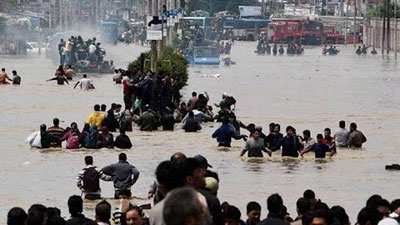 Srinagar:
Srinagar: The floodwaters may be slowly receding in Srinagar but that doesn’t bring much relief to state authorities who are bracing for what is most likely to come next: the spread of water-borne diseases.
Chief minister Omar Abdullah admitted as much when he said that the likely spread of diseases was the main source of worry for him after the water recedes. “Water levels are receding faster than I expected.”
Stagnant water, the paucity of clean drinking water and people living in close quarters in ill-equipped relief camps is a recipe for a disease disaster. “We are preparing ourselves for diarrhoea and measles which is common when people live in clusters,” said Dr Salim Rehman, director, health services of the state’s health department.
Rehman added that he and his colleagues were not apprehensive of the possible outbreak of dengue and malaria as mosquitoes do not survive in the weather conditions of the Kashmir Valley.
Since the provision of clean drinking water is essential to prevent the spread of water-borne diseases, the health department has been asked to supply chlorinated water in tankers at all relief camps. The Central government on Wednesday also flew in supplies of chlorine tablets to make drinking water potable at relief camps as the supply of packaged water is unlikely to suffice.
The health department has set up medical centres at relief camps to treat patients symptomatically.
Dr Rehman was concerned that the lack of communication facilities was hampering the health department’s attempts to contact flood-affected people. “We had requested Radio Kashmir to broadcast details about our control room in Srinagar but its network too was not working. We will be able to reach out to people and relief camps only when mobile networks are restored.”
The floodwaters may be slowly receding in Srinagar but that doesn’t bring much relief to state authorities who are bracing for what is most likely to come next: the spread of water-borne diseases.
Chief minister Omar Abdullah admitted as much when he said that the likely spread of diseases was the main source of worry for him after the water recedes. “Water levels are receding faster than I expected.”
Stagnant water, the paucity of clean drinking water and people living in close quarters in ill-equipped relief camps is a recipe for a disease disaster. “We are preparing ourselves for diarrhoea and measles which is common when people live in clusters,” said Dr Salim Rehman, director, health services of the state’s health department.
Over five lakh people are still stranded in flood-ravaged Jammu and Kashmir and Prime Minister Narendra Modi has asked for rescue and relief operations to be ramped up after being briefed at an emergency meeting last night. Almost 200 people have died in the state's worst floods in decades.
PM Modi has directed the Home Ministry to immediately depute senior officers from Delhi and other states to coordinate relief operations with the local administration. He has emphasized on the need to reach food and essentials to those stranded, and ensure basic hygiene and sanitation in water-logged areas.
There are also concerns about the potential spread of water-borne diseases. 80 medical teams of the Armed Forces Medical Services have swung into action. The Army has also set up medical camps and said their doctors are treating 200-300 people every day.
People still marooned on rooftops or clinging to trees for days are now in dire need of water and food. "We want food and water urgently. Please save us," pleaded Meena Ahmed, who, along with her family members, has been stranded in Qayoom Colony in Rawalpora for the past five days.
Nearly 80,000 people have been rescued so far in a non-stop, tireless operation by the armed forces and the National Disaster Response Force or the NDRF. Over 20,000 army personnel are carrying out relief operations. 715 tonnes of relief material have been air dropped.
The seething anger against the alleged delay in the rescue operations was palpable on Wednesday when Army vehicles, loaded with supplies including water and food, were pelted with stones as they tried to make their way through Srinagar.
Chief Minister Abdullah has claimed that before the heavy rains began late last week, warnings were announced at mosques and from police vehicles, urging residents to move to higher ground. "I am sorry to say that they willingly ignored these warnings...choosing to stay where they are," Mr Abdullah said.
The Election Commission has postponed a two-day trip to the state to discuss assembly polls, expected to be held late in December. The floods may delay the election process, said an EC official.
With rain having stopped and water receding, the extent of devastation is becoming more evident. In the Jammu region, people returned to their villages to find homes destroyed and crops washed away.
 Srinagar: The floodwaters may be slowly receding in Srinagar but that doesn’t bring much relief to state authorities who are bracing for what is most likely to come next: the spread of water-borne diseases.
Srinagar: The floodwaters may be slowly receding in Srinagar but that doesn’t bring much relief to state authorities who are bracing for what is most likely to come next: the spread of water-borne diseases.